Once Upon a Time in China (1991)
Directed by: Tsui Hark
Written by: Elsa Tang, Kai-Chi Yuen, Tsui Hark, Yiu-ming Leung
Starring: Jackie Cheung, Jet Li, Rosamund Kwan, Yuen Biao
AKA WONG FEI HUNG
China/Hong Kong
AVAILABLE ON BLU-RAY: NOW, in EUREKA ENTERTAINMENT’S ‘ONCE UPON A TIME IN CHINA’ TRILOGY BOXSET
RUNNING TIME: 134 mins
REVIEWED BY: Dr Lenera, Official HCF Critic
Foshan, China in the late 19th century during the Qing dynasty, when the country is being oppressed by western plunderers and its heritage is under threat. Wong Fei-Hung is the martial arts instructor of the local militia and also runs his own traditional Chinese medicine clinic. When his 13th aunt Yee arrives back from America totally westernised, Wong assumes the role of her protector as well as developing a forbidden crush on her, while his martial arts school and the militia become involved in conflicts with both foreign and local government even though Wong believes in resolving trouble in a peaceful fashion.…
Once Upon A Time In China was one of the films that got me into Hong Kong movies back in the early 90’s, a time when there was already a major fan base for these films in the UK but we still had to often make do with videos of dubious legality if we wanted to see them. Sometimes we didn’t even get subtitles, which in many cases wasn’t a big deal but which would have made something like this particular film very hard to follow. Hugely ambitious in its day and a movie that revived the traditional martial arts movie which hadn’t been popular in at least ten years, director Tsui Hark and his co-writers Yiu-ming Leung, Elsa Tang and Kai-Chi Yung attempted to elevate the genre by bringing in an explicit political aspect and looking at the clash of cultures and matters of national identity of a country which had spent much of its recent history being ruled by others, while also populating the film with more rounded characters than usual, most of them full of divided loyalty. They tried to do this while still giving us a series of incredible fight sequences, climaxing in a duel on ladders between Jet Li and perennial martial arts movie villain Yen Shi-kwan which became an instant classic of its kind and is still incredible to watch, the kind of scene where you just sit there open mouthed as you view it whether it’s your tenth time or your first. For the most part, Hark and company succeeded in their objectives, the resulting film being one which even non fans of the genre may get caught up in. It proved in many way before a certain rather overrated film from Ang Lee came along that films of this kind could be intelligent and very well made. Some might say that there are too many villains, but the plot really is fairly easy to follow as long as you’re prepared to concentrate rather than use the bits in between the martial arts sequences as mere breathers.
This was actually the 99th [yes, the 99th, 77 of them starring the same actor] film to feature the real life Chinese folk hero Wong Fei-Hung, whose western equivalent would probably be Robin Hood, though there hadn’t been one for some time when Tsui Hark was asked to direct Once Upon A Time In China. Originally it was to reunite Jackie Chan, Sammo Hung and Yuen Biao, the three most famous of the Seven Little Fortunes Chinese opera child performers who’d fallen out after making several classics like Project A and Wheels On Meals. Chan would have played Wong [who he’d previously played in Drunken Master], Hung would have played Butcher Wing [as he’d done in Magnificent Butcher], and Biao would have been Foon Leung [which he was in Magnificent Butcher]. For reasons unclear, this idea fell through and only Biao made it into the finished film which reunited Hark with the rising star Jet Li. The big production, though shot largely on the Shaw Brothers back lot, featured several different units, several different action directors and several cinematographers. Li badly damaged his leg during his umbrella fight scene, meaning that he was subsequently doubled a great deal, while most of the final fight was performed while he was in plaster and was mainly shot from the waist and above. The film was a smash and, as usual, led to a wave of imitations as well as six official sequels. Li himself played the similar hero Fong Sai Yuk in two movies. The US version cut an astounding 35 minutes from the film, including the entire opening lion dance sequence, many character introductions, most of the comedy, some bloody footage and even some fighting.
As with many of the best movies in this genre, some time passes before our hero really cuts loose, though the very first scene gives us a clue as to his abilities when Liu Yongfu, the commander of the Black Flag Army, invites Wong on board his ship to watch a lion dance. The sound of firecrackers makes some sailors on board a nearby French ship think that Liu’s ship is opening fire at them, so they return fire and injure the dancers. Wong picks up the lion head and finishes the performance, walking and jumping about on some ropes as he does so. Foreign warships are massing in the bay, and Liu gives Wong a fan inscribed with all the unequal treaties signed between China and other countries. The titles, set to the immortal Wong Fei Hung theme given vocals, show Wong and his students practising martial arts on a beach as the sun sets, finishing with a very lingering shot of Wong looking like he’s in the sky as he looks at the viewer. China’s situation is then neatly evoked as some traditional musicians are drowned out by a procession of Christians singing, though as with some other aspects of this film, things are not cut and dried. These priests might be arrogant, but later on the head one speaks out as a witness and sacrifices his life for one of the main characters. Some of the early scenes rely on the type of comedy which us westerners tend to find mildly amusing rather than particularly funny. Biao gets to show off his athletic abilities very early on, but his character, along with a portly one called – Porky [nothing new in Hong Kong cinema], are also the source of much of the humour as he mistakes Porky for Wong and causes some accidents. These scenes were probably put in to relax local audiences before the film got heavier and more involved, and the comedy does lessen, though Wong and Foon comically come to blows several times throughout.
Foon begins to be trained by Wong, but keeps getting blamed for things he didn’t do, and therefore decides to switch to following “Iron Vest” Yim, though this guy isn’t truly evil, just out to make a name for himself by defeating Wong. On the other hand the bullying Shaho gang have no redeeming qualities and eventually team up with some even more despicable Americans after having lost several run-ins with Wong. And even the local government seems to want to act against, rather than for, the people. Wong does have several apprentices with names like Bucktooth So on his side, plus the rather westernised Aunt Lee. The two are instantly attracted to each other, but nothing is really spoken. There’s a lovely moment that says a lot when it looks like she’s stroking his face in shadow, then kissing him which makes him recoil, though of course in reality they’re not that close at all. Also great is when she outdoes him in being traditionally Chinese during a viewing of an opera. Wong just doesn’t know what to say. Wong attempts to find an honourable, peaceful path through the collision between cultures and he and his militia being framed, and it’s Biao rather than Li who initially gets most of the action, but eventually Wong has to resort to his tremendous martial arts skill, wielding an umbrella in an incredible fashion, after which you’re never more than 15 minutes away from a brawl. Some of them, especially the ones when Wong battles opponents en masse, feature a fair bit of wire work, others, like the first fight between Wong and Yim set in the pouring rain, don’t have much at all. Wong was actually a famous practitioner of hung gar kung fu, although the techniques Li uses are mostly of the Northern Shaolin long fist method and tai chi, plus of course his famous wu shu.
A bloody massacre scene and a brutal bit where the Shaho gang leader tries to rape Yee seem almost out of place here, and you still get some lines like: “The method and works of Master Wong’s Hung Fist are well known. I hear Master Wong’s Shadowless Kick and Crazy Fist are tremendous”. A couple of parts of the story don’t quite fit together and I could perhaps have done with a few aspects being given greater clarification, but it’s not hard to follow really and the final reel really is martial arts cinema heaven. Yet the human side is never forgotten. Once Upon A Time In China is filled with characters who are confused about their loyalties, their culture, and their ability to communicate. Wong himself isn’t just struggling to protect his countrymen in an environment where doing so is usually against the law, he’s fighting a losing battle against the encroachment of western culture. Of course with one exception the non-Chinese characters are all disliekable but then again the British, Russians, Americans, French, Germans and Portuguese were all trying to carve the country up. We’re shown how these foreign influences are eroding a native culture, and even get scenes such as when a someone using a new device called a camera almost kills somebody with it. It’s quite surprising how forthright the filmmakers are about all this, and yet in places, especially in the final scene where Wong does something he said he’d never do earlier, they do suggest that some kind of assimilation of westernism was necessary for the advancement of the country.
Even back then Li was never a great actor, but he was already good at expressing a person in thought, and he does project the humility, intelligence and honour of the character he plays, which manages to be enough. I could have done without Wong’s final feat with a bullet, though some will find the moment to be incredibly cool. Baio gives possibly one of his best performances here. The role gives him an opportunity for him to show his range. Foon has to goof around, also fall in love with Yee, be resentful and frustrated, turn to the dark side etc. Meanwhile the sets are always convincing and Hark gives us a fine looking film with some quite artistic shots, plus he has a knack for using slow motion well at certain moments, like when Yee comes into a prison slowly passing the other side of some bars like a ghost. James Wong’s score, written mostly in the pentatonic scale, has several decent themes though you may get sick of the Wong Fei Hung theme being played every time Wong begins to do something cool, while some of the performers in minor roles act in a comically exaggerated fashion. In general though Once Upon A Time In China is still mighty impressive all round and one of the all-time great Hong Kong movies.
Rating: 









Once Upon A Time In China looks every bit as good as the Project A films did from Eureka. Despite it being another Ritrovata restoration, there’s actually far less yellow than the Hong Kong Legends DVD. It seems that Ritrovata have at last started to know what they’re doing. Meanwhile image density is just right, grain is well managed, there’s no black crush. I have no complaints at all. As usual I was more than satisfied with the Cantonese mono soundtrack, though did check out the others. The Cantonese stereo is much louder but seems to be very faithful to the mono with no stupid additions. Li and some of the other cast members are speaking Mandarin in the film, therefore the Mandarin track is more in synch, though considering where the film is set Cantonese is still the advised language to watch the film in. There’s rather more swearing in the newly translated subtitles, but I guess they’re now more accurate. As for the English dub, it’s actually pretty lousy and sounds rather fake, as if the recording was rushed.
For all three of the films in this set, Eureka have ported over the interviews from the Hong Kong Legends DVD releases, and added a three part documentary on Wong Fei-Hung from Chinese TV plus new audio commentaries to replace the old Bey Logan ones which they understandably didn’t want to use. All three talk tracks feature Hong Kong movie expert, producer and casting director Mike Leeder, and filmmaker Arne Venema, and judging by the one on the first film they’re a great team, bouncing off each really well, amusing and enthusiastic yet still full of knowledge. They also sound unrehearsed and mention each cast member without reciting all their credits, which is a nice change. Among many interesting tidbits is Biao being told his character was far more prominent than Li’s just before shooting, and that martial arts challenges were still going in Hong Kong in the ’70s.
The Legend of Wong Fei-hung is a documentary made in China, judging by this installment in 2002 just before Once Upon A Time In China 2 came out which it advises viewers to go and see. The first part shows you the Wong memorial building in Foshan with the only known photograph of him in existence, then describes his childhood and early martial arts career. The interview with Yen Shi-kwan is dubbed and takes place during some kind of noisy gathering, as the Shaw Brothers legend describes how he prepares for a role, talks about Li and Jackie Chan, and mentions how he nearly died during a wire accident. The Jet Li interview also seems to take place at a convention, though this time in a quiet room, with some of the annoying background music Hong Kong Legends used to think was necessary to these things for a while. He mentions his two favourite movies of his, the price of fame, and his martial arts. Neither interview is in-depth, but a worth a watch anyway.
SPECIAL LIMITED EDITION BOXSET
*1080p presentations of all three films, sourced from a brand new 4K restorations and making their UK debuts on Blu-ray
*Original Cantonese audio tracks
*Optional Mandarin and English audio tracks
*Optional English subtitles
*Once Upon a Time in China and America [100 mins, HD] – The final chapter in the Once Upon a Time in China series, with Jet Li making a triumphant return to his most iconic role
PLUS: Collector’s booklets featuring new essays on all four films by James Oliver
ONCE UPON A TIME IN CHINA
*Audio commentary from martial arts cinema authority Mike Leeder and filmmaker Arne Venema
*The Legend of Wong Fei-hung [13 mins] – a three-part featurette on the legendary folk hero
*Archival interview with actor and Shaw Brothers veteran Yen Shi-kwan [10 mins]
*Archival interview with Jet Li [10 mins]
*Theatrical trailer
ONCE UPON A TIME IN CHINA 2 review Coming Soon!

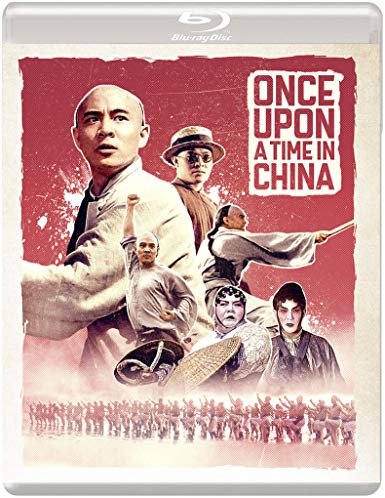
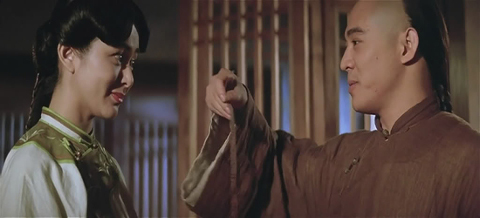
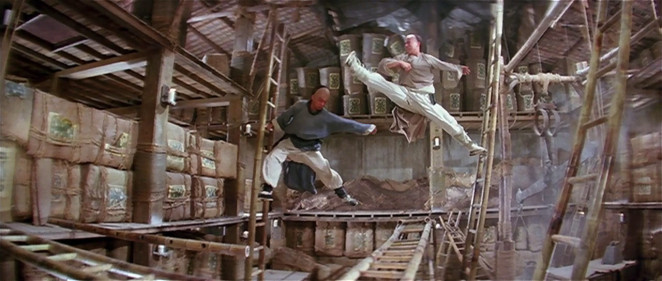
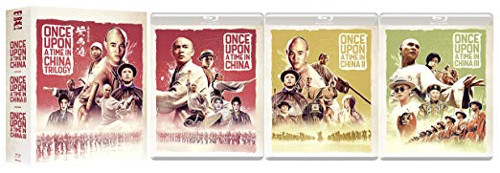

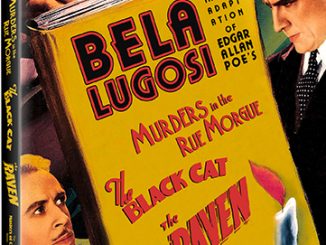
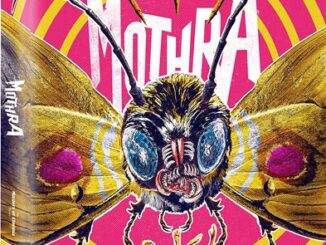
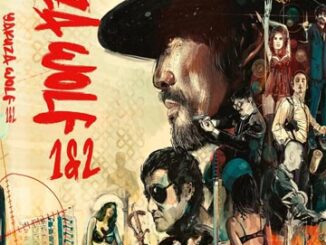
Be the first to comment